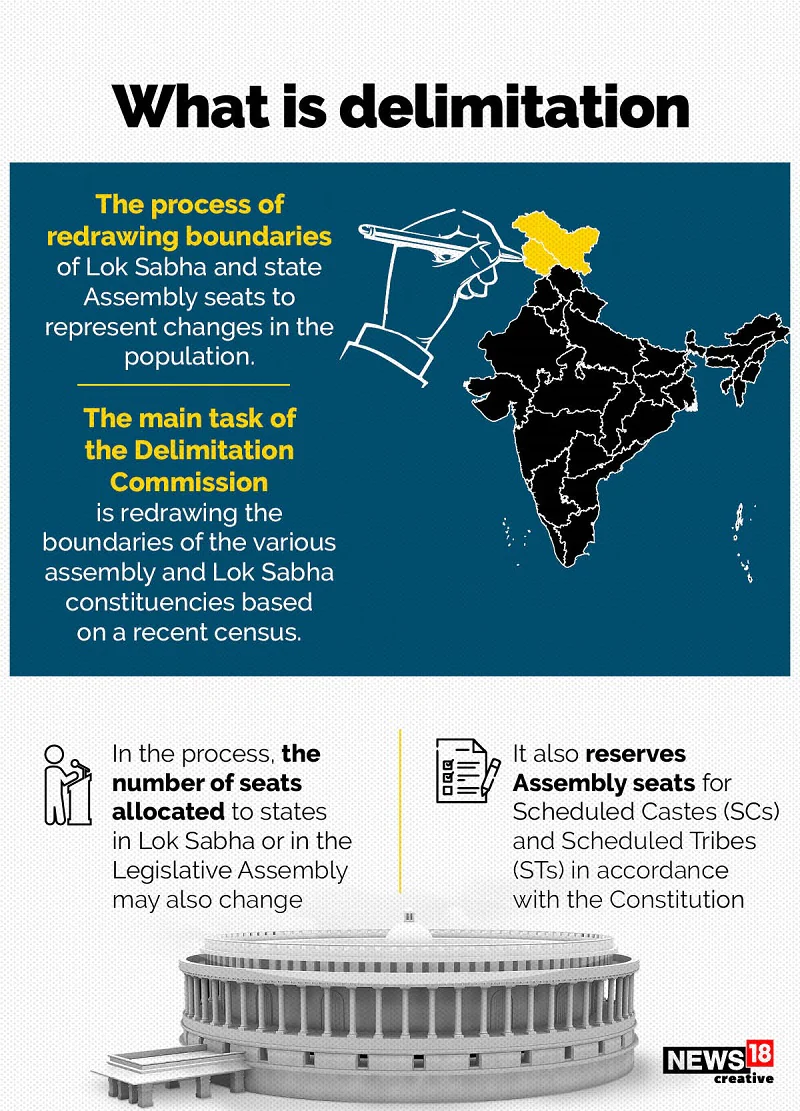Description

Copyright infringement is not intended
Context: Controversy over the draft report published by Delimitation Commission for the Jammu and Kashmir Assembly.
Details:
- The Draft published by the Delimitation Commission for the Jammu and Kashmir Assembly has started a controversy.
- Under the draft published, some villages in one constituency are surrounded by villages of another.
- The Delimitation Commission of Jammu and Kashmir is chaired by retired Justice Ranjana Prakash Desai and includes Chief Election Commissioner Sushil Chandra and the State Election Commissioner as ex-officio members.
- As per Article 170, the states get classified into territorial constituencies after every census, according to the Delimitation Act.
About Delimitation Commission of India:
- Delimitation literally means the act or process of fixing limits or boundaries of territorial constituencies in a country or a province having a legislative body.
- Article 82 - Parliament by law enacts a Delimitation Act after every Census.
- The Delimitation Commission is appointed by the President of India and works in collaboration with the Election Commission of India.
- The main task of the commission is redrawing the boundaries of the various assembly and Lok Sabha constituencies based on a current census.
- The representation from each State is not changed during this exercise. However, the number of SC and ST seats in a state are changed in accordance with the census.
- The present delimitation of constituencies has been done on the basis of 2001 census under the provisions of Delimitation Act, 2002.
- The Commission is a powerful and independent body whose orders cannot be challenged in any court of law.
- The orders are laid before the Lok Sabha and the respective State Legislative Assemblies. However, modifications are not permitted.
- Delimitation commissions have been set up four times in the past; 1952, 1962, 1972 and 2002, under the Delimitation Commission Acts of 1952, 1962, 1972 and 2002.
- The present delimitation of parliamentary constituencies within states has been done on the basis of the 2001 census.
- According to the 84th amendment, the present constituencies carved out on the basis of the 2001 census shall continue to be in operation till 2026.
Functions of Delimitation Commission:
- The Delimitation Commission has to determine the number and boundaries of constituencies in such a manner that the population of all seats is the same, as far as practically possible.
- The Commission also identifies the seats to be reserved for the scheduled castes and scheduled tribes communities, in areas where their population is significant.
- The Commission releases draft proposals to the public through the Gazette of India and the official gazettes of states, and also in regional language newspapers.
- It also conducts public sittings wherein the public’s opinion is heard through written or oral representations.
- If found appropriate, changes are made to the draft proposal.
- The final order is published in the Gazettes and comes into effect by a date specified by the President.
Delimitation challenges:
- The present delimitation is based on the census of 2001, whereas the total number of seats in the Parliament and the Legislative Assemblies is fixed as per the census of 1971.
- The Constitution of India has put a cap on the maximum number of seats in the Lok Sabha to 550 and Rajya Sabha to 250. Therefore an increasing number of populations are being represented by a single representative.














